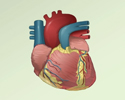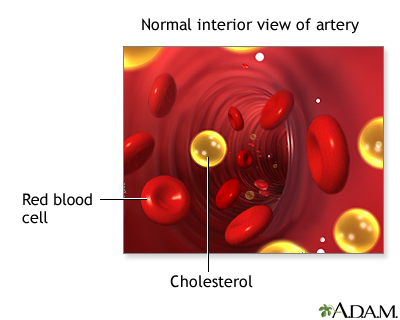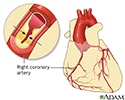High blood cholesterol levels
Cholesterol - high; Lipid disorders; Hyperlipoproteinemia; Hyperlipidemia; Dyslipidemia; HypercholesterolemiaCholesterol is a fat (also called a lipid) that your body needs to work properly. Too much bad cholesterol in your blood can increase your chance of getting heart disease, stroke, and other problems.
Heart disease
Coronary heart disease is a narrowing of the blood vessels that supply blood and oxygen to the heart. Coronary heart disease (CHD) is also called co...

Stroke
A stroke occurs when blood flow to a part of the brain stops. A stroke is sometimes called a "brain attack. " If blood flow is cut off for longer th...

Common medical terms for high blood cholesterol are lipid disorder, hyperlipidemia, or hypercholesterolemia, with the last being the most precise.
Causes
There are many types of cholesterol. The ones talked about most are:
- Total cholesterol -- all the cholesterols combined
- High density lipoprotein (HDL) cholesterol -- often called good cholesterol
- Low density lipoprotein (LDL) cholesterol -- often called bad cholesterol
For many people, abnormal cholesterol levels are partly due to lifestyle choices. This often includes eating a diet that is high in fat. Other lifestyle factors are:
Lifestyle choices
Your body needs cholesterol to work well. But cholesterol levels that are too high can harm you. In the US, blood cholesterol is most often measured...

Eating a diet that is high in fat
A healthy diet is an important factor in reducing your risk for heart disease.

- Being overweight
Overweight
Overweight and obesity mean having a weight than is higher than what is healthy for a given height. A person may be overweight from extra muscle, bo...
 ImageRead Article Now Book Mark Article
ImageRead Article Now Book Mark Article - Lack of exercise
Cholesterol producers
Cholesterol is a waxy, fat-like material that is found in all parts of the body. It comes from two sources: our liver produces it, and we consume it in animal products.
Some health conditions can also lead to abnormal cholesterol, including:
-
Diabetes
Diabetes
Diabetes is a long-term (chronic) disease in which the body cannot regulate the amount of sugar in the blood.
 ImageRead Article Now Book Mark Article
ImageRead Article Now Book Mark Article -
Kidney disease
Kidney disease
Chronic kidney disease is the slow loss of kidney function over time. The main job of the kidneys is to remove wastes and excess water from the body...
 ImageRead Article Now Book Mark Article
ImageRead Article Now Book Mark Article -
Polycystic ovary syndrome
Polycystic ovary syndrome
Polycystic ovary syndrome (PCOS) is a condition in which a woman has increased levels of male hormones (androgens). Many problems occur as a result ...
 ImageRead Article Now Book Mark Article
ImageRead Article Now Book Mark Article - Pregnancy and other conditions that increase levels of female hormones
-
Underactive thyroid gland
Underactive thyroid gland
Hypothyroidism is a condition in which the thyroid gland does not make enough thyroid hormone. This condition is often called underactive thyroid....
 ImageRead Article Now Book Mark Article
ImageRead Article Now Book Mark Article
Medicines such as certain birth control pills, diuretics (water pills), beta-blockers, and some medicines used to treat depression may also raise cholesterol levels. Several disorders that are passed down through families lead to abnormal cholesterol and triglyceride levels. They include:
- Familial combined hyperlipidemia
- Familial dysbetalipoproteinemia
- Familial hypercholesterolemia
- Familial hypertriglyceridemia
Smoking does not cause higher cholesterol levels, but it can reduce your HDL (good) cholesterol.
Exams and Tests
A cholesterol test is done to diagnose a lipid disorder. Different experts recommend different starting ages for adults.
- Recommended starting ages are between 20 to 35 for men and 20 to 45 for women.
- Adults with normal cholesterol levels should have the test repeated every 5 years.
- Repeat testing sooner if changes occur in lifestyle (including weight gain and diet).
- Adults with a history of elevated cholesterol, diabetes, kidney problems, heart disease, and other conditions require more frequent testing.
It is important to work with your health care provider to set your cholesterol goals. Newer guidelines steer providers away from targeting specific levels of cholesterol. Instead, they recommend different treatments or medicines and doses depending on a person's history and risk factor profile. These guidelines change from time to time as more information from research studies becomes available.
General targets are:
- LDL: Less than 100 mg/dL (2.59 mmol/L) - lower numbers are better
- HDL: 60 mg/dL (1.55 mmol/L) or higher - higher numbers are better
- Total cholesterol: Less than 200 mg/dL (5.18 mmol/L) - lower numbers are better
- Triglycerides: Less than 150 mg/dL (1.69 mmol/L) - lower numbers are better
Cholesterol
Cholesterol is a soft, waxy substance that is present in all parts of the body including the nervous system, skin, muscle, liver, intestines, and heart. It is made by the body and obtained from animal products in the diet. Cholesterol is manufactured in the liver and is needed for normal body functions including the production of hormones, bile acid, and Vitamin D. Excessive cholesterol in the blood contributes to atherosclerosis and subsequent heart disease. The risk of developing heart disease or atherosclerosis increases as the level of blood cholesterol increases.
If your cholesterol results are abnormal, you may also have other tests such as:
-
Blood sugar (glucose) test to look for diabetes
Blood sugar (glucose) test
A blood sugar test measures the amount of sugar (glucose) in a sample of your blood. Glucose is a major source of energy for most cells of the body, ...
 ImageRead Article Now Book Mark Article
ImageRead Article Now Book Mark Article -
Kidney function tests
Kidney function tests
Kidney function tests are common lab tests used to evaluate how well the kidneys are working. Such tests include:BUN (Blood urea nitrogen) Creatinin...
 ImageRead Article Now Book Mark Article
ImageRead Article Now Book Mark Article -
Thyroid function tests to look for an underactive thyroid gland
Thyroid function tests
Thyroid function tests are used to check whether your thyroid is working normally. The most common thyroid function tests are:Free T4 (free thyroxine...
 ImageRead Article Now Book Mark Article
ImageRead Article Now Book Mark Article
Treatment
Steps you can take to improve your cholesterol levels and to help prevent heart disease and a heart attack include:
-
Quit smoking. This is the single biggest change you can make to reduce your risk of heart attack and stroke.
Quit smoking
There are many ways to quit smoking. There are also resources to help you. Family members, friends, and co-workers may be supportive. But to be su...
 ImageRead Article Now Book Mark Article
ImageRead Article Now Book Mark Article - Eat foods that are naturally low in fat. These include whole grains, fruits, and vegetables.
- Use low-fat toppings, sauces, and dressings.
- Avoid foods that are high in saturated fat.
Saturated fat
Saturated fat is a type of dietary fat. It is one of the unhealthy fats, along with trans fat. These fats are most often solid at room temperature....
 ImageRead Article Now Book Mark Article
ImageRead Article Now Book Mark Article - Exercise regularly.
- Lose weight if you are overweight.
Your provider may want you to take medicine for your cholesterol if lifestyle changes do not work. This will depend on:
- Your age
- Whether or not you have heart disease, diabetes, or other blood vessel problems
- Whether you smoke or are overweight
- Whether you have high blood pressure or diabetes
High blood pressure
Blood pressure is a measurement of the force exerted against the walls of your arteries as your heart pumps blood to your body. Hypertension is the ...
 ImageRead Article Now Book Mark Article
ImageRead Article Now Book Mark Article
You are more likely to need medicine to lower your cholesterol:
Medicine to lower your cholesterol
Your body needs cholesterol to work properly. But extra cholesterol in your blood causes deposits to build up on the inside walls of your blood vess...

- If you have heart disease or diabetes
- If you are at high risk for heart disease (even if you do not yet have any heart problems)
- If your LDL cholesterol is 190 mg/dL (4.92 mmol/L) or higher
Almost everyone else may get health benefits from LDL cholesterol that is lower than 160 to 190 mg/dL (4.14 mmol/L to 4.92 mmol/L).
There are several types of medicines to help lower blood cholesterol levels. The medicines work in different ways. Statins are one kind of drug that lowers cholesterol and has been proven to reduce the chance of heart disease. Other medicines are available if your risk is high and statins do not lower your cholesterol levels enough. These include ezetimibe and PCSK9 inhibitors.
Outlook (Prognosis)
High cholesterol levels can lead to hardening of the arteries, also called atherosclerosis. This occurs when fat, cholesterol, and other substances build up in the walls of arteries and form hard structures called plaques.
Hardening of the arteries
Atherosclerosis, sometimes called "hardening of the arteries," occurs when fat, cholesterol, and other substances build up in the walls of arteries. ...

Developmental process of atherosclerosis
The development of arterial atherosclerosis may occur when deposits of cholesterol and plaque accumulate at a tear in the inner lining of an artery. As the deposits harden and occlude the arterial lumen, blood flow to distant tissues decreases and a clot may become lodged, completely blocking the artery.
Over time, these plaques can block the arteries and cause heart disease, stroke, and other symptoms or problems throughout the body.
Disorders that are passed down through families often lead to higher cholesterol levels that are harder to control.
References
American Diabetes Association Professional Practice Committee. 10. Cardiovascular disease and risk management: standards of care in diabetes-2025. Diabetes Care. 2025;48(Supplement_1):S207-S238. PMID: 39651970 pubmed.ncbi.nlm.nih.gov/39651970/.
Arnett DK, Blumenthal RS, Albert MA, et al. 2019 ACC/AHA Guideline on the primary prevention of cardiovascular disease: executive summary: a report of the American College of Cardiology/American Heart Association Task Force on Clinical Practice Guidelines. Circulation. 2019;140(11):e563-e595. PMID: 30879339 pubmed.ncbi.nlm.nih.gov/30879339/.
Genest J, Mora S, Libby P. Lipoprotein disorders and cardiovascular disease. In: Libby P, Bonow RO, Mann DL, Tomaselli GF, Bhatt DL, Solomon SD, eds. Braunwald's Heart Disease: A Textbook of Cardiovascular Medicine. 12th ed. Philadelphia, PA: Elsevier; 2022:chap 27.
Grundy SM, Stone NJ, Bailey AL, et al. 2018 AHA/ACC/AACVPR/AAPA/ABC/ACPM/ADA/AGS/APhA/ASPC/NLA/PCNA guideline on the management of blood cholesterol: executive summary; a report of the American College of Cardiology/American Heart Association Task Force on Clinical Practice Guidelines. J Am Coll Cardiol. 2019;73(24):3168-3209. PMID: 30423391 pubmed.ncbi.nlm.nih.gov/30423391/.
Robinson JG. Disorders of lipid metabolism. In: Goldman L, Cooney KA, eds. Goldman-Cecil Medicine. 27th ed. Philadelphia, PA: Elsevier; 2024:chap 190.
US Preventive Services Task Force; Mangione CM, Barry MJ, et al. Statin use for the primary prevention of cardiovascular disease in adults: US Preventive Services Task Force Recommendation Statement. JAMA. 2022;328(8):746-753. PMID: 35997723 pubmed.ncbi.nlm.nih.gov/35997723/.
US Preventive Services Task Force; Barry MJ, Nicholson WK, et al. Screening for lipid disorders in children and adolescents: US Preventive Services Task Force Recommendation Statement. JAMA. 2023;330(3):253-260. PMID: 37462699 pubmed.ncbi.nlm.nih.gov/37462699/.
-
Cholesterol producers - illustration
Cholesterol is a waxy, fat-like material that is found in all parts of the body. It comes from two sources: our liver produces it, and we consume it in animal products.
Cholesterol producers
illustration
-
Coronary artery disease - illustration
The coronary arteries supply blood to the heart muscle itself. Blood supply through these arteries is critical for the heart. Coronary artery disease usually results from the build-up of fatty material and plaque, a condition called atherosclerosis. As the coronary arteries narrow, the flow of blood to the heart can slow or stop, causing chest pain (stable angina), shortness of breath, heart attack, or other symptoms.
Coronary artery disease
illustration
-
Cholesterol - illustration
Cholesterol is a soft, waxy substance that is present in all parts of the body including the nervous system, skin, muscle, liver, intestines, and heart. It is made by the body and obtained from animal products in the diet. Cholesterol is manufactured in the liver and is needed for normal body functions including the production of hormones, bile acid, and Vitamin D. Excessive cholesterol in the blood contributes to atherosclerosis and subsequent heart disease. The risk of developing heart disease or atherosclerosis increases as the level of blood cholesterol increases.
Cholesterol
illustration
-
Developmental process of atherosclerosis - illustration
The development of arterial atherosclerosis may occur when deposits of cholesterol and plaque accumulate at a tear in the inner lining of an artery. As the deposits harden and occlude the arterial lumen, blood flow to distant tissues decreases and a clot may become lodged, completely blocking the artery.
Developmental process of atherosclerosis
illustration
-
Cholesterol producers - illustration
Cholesterol is a waxy, fat-like material that is found in all parts of the body. It comes from two sources: our liver produces it, and we consume it in animal products.
Cholesterol producers
illustration
-
Coronary artery disease - illustration
The coronary arteries supply blood to the heart muscle itself. Blood supply through these arteries is critical for the heart. Coronary artery disease usually results from the build-up of fatty material and plaque, a condition called atherosclerosis. As the coronary arteries narrow, the flow of blood to the heart can slow or stop, causing chest pain (stable angina), shortness of breath, heart attack, or other symptoms.
Coronary artery disease
illustration
-
Cholesterol - illustration
Cholesterol is a soft, waxy substance that is present in all parts of the body including the nervous system, skin, muscle, liver, intestines, and heart. It is made by the body and obtained from animal products in the diet. Cholesterol is manufactured in the liver and is needed for normal body functions including the production of hormones, bile acid, and Vitamin D. Excessive cholesterol in the blood contributes to atherosclerosis and subsequent heart disease. The risk of developing heart disease or atherosclerosis increases as the level of blood cholesterol increases.
Cholesterol
illustration
-
Developmental process of atherosclerosis - illustration
The development of arterial atherosclerosis may occur when deposits of cholesterol and plaque accumulate at a tear in the inner lining of an artery. As the deposits harden and occlude the arterial lumen, blood flow to distant tissues decreases and a clot may become lodged, completely blocking the artery.
Developmental process of atherosclerosis
illustration
-
Hypercholesterolemia
(Alt. Medicine)
-
Atherosclerosis
(Alt. Medicine)
-
Diabetes
(Alt. Medicine)
-
Cholesterol - InDepth
(In-Depth)
-
High blood pressure
(Alt. Medicine)
-
High blood pressure - InDepth
(In-Depth)
-
Myocardial infarction
(Alt. Medicine)
-
Diabetes - type 1 - InDepth
(In-Depth)
-
Stroke
(Alt. Medicine)
-
Diabetes - type 2 - InDepth
(In-Depth)
- Cholesterol and lifestyle
- Cholesterol testing and results
- Cholesterol - drug treatment
- Type 1 diabetes - self-care
- Bile acid sequestrants for cholesterol
- Type 2 diabetes - oral medicines
- Type 2 diabetes - self-care
- Dietary fats explained
- Diabetes - preventing heart attack and stroke
- Long-term complications of diabetes
Review Date: 1/1/2025
Reviewed By: Michael A. Chen, MD, PhD, Associate Professor of Medicine, Division of Cardiology, Harborview Medical Center, University of Washington Medical School, Seattle, WA. Also reviewed by David C. Dugdale, MD, Medical Director, Brenda Conaway, Editorial Director, and the A.D.A.M. Editorial team.









